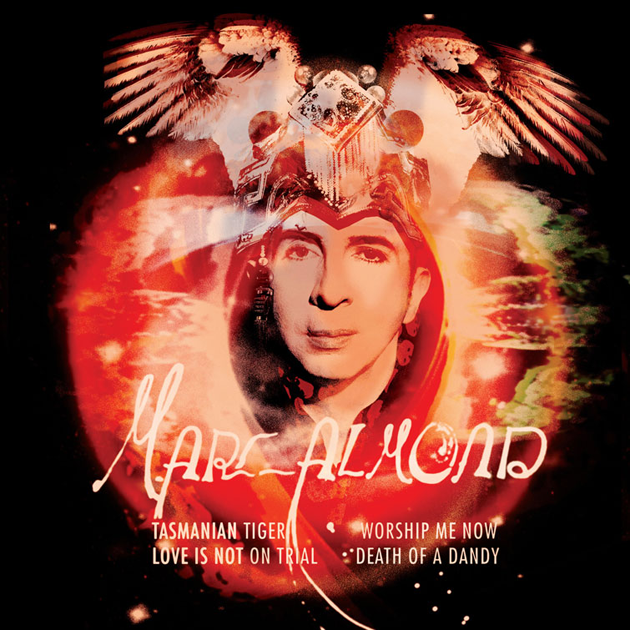The more time passes, the more Marc Almond’s career approaches something that might be called sui generis, something that seems immediately familiar but becomes a little less so the more you look, where Soft Cell is far less a centerpiece of a career than one creative outlet among many – merely one of the earliest and still the most famous. Almond’s dizzying array of solo projects, collaborations and dramatic performances over the decades – and there’s probably no-one else in the world who can claim to have worked with Coil, Gene Pitney and Russian musical legend Alla Bayanova, to name just three of many – has been a remarkable creative churn that shows no signs of slowing, even following his near death by accident in 2004 and occasional health problems since. It’s only been recently that Almond has turned back to full solo work under his own name on top of everything else, resulting in the release of Tasmanian Tiger.
It’s not his first such effort in recent months. Last year’s ‘Burn Bright’/’The Dancing Marquis’ single was an enjoyable enough tiptoe back into the full solo waters, also notably featuring production from Tony Visconti. If the songs felt engagingly polite and loose rather than dramatically focused by comparison to his previous full solo effort – 2010’s remarkable Variete – they were still fun exercises, especially the latter track’s brash strut. The four song Tasmanian Tiger ups the ante in comparison just enough – if anything it’s nicely bold, and yet somehow typically Almond, to release this the same month as a recording of his Tyburn Tree project with composer John Harle. If this is ‘just’ a pop effort in comparison, it’s more accurate to say it’s just another facet of Almond’s art coming back to the fore once again, his singing voice maybe just a little more intimate and less extreme with time, but no less gently beguiling, always suggesting that a surge of emotion isn’t far off.
There’s another key thread running throughout the EP – a sense of intergenerational UK rock exchanges, both forward and backward from Almond’s own generation, starting with the return of Visconti on production duties for two songs. That Almond loves Marc Bolan has long been obvious, whether it’s namechecks in lyrics or other nods, and the title track is a full-on tribute right down to the title phrase, turning the actual story of the now-extinct animal into a metaphor for being a sole survivor in the face of the crowd and history. The pocket symphony sound, strings and all, along with the backing vocals makes for something straight from the Tanx/Zinc Alloy era. ‘Death Of A Dandy’ takes the slow-burn ballad route in a tribute to friend and fellow Bolan fanatic Sebastian Horsley, not to mention including guitar and singing from Danielz, leader of the long running tribute band T. Rextasy. There’s plenty of ruined glamour moments – "You’re all out of witticisms, no more the bon vivant" – but a line like "Sometimes all the love in the world is never quite enough" suddenly cuts a little deeper, indicating the type of struggle people can face with themselves, no matter the fame or success.
In spirited contrast is something even the Bopping Elf never had a chance to try, namely sleazed-out crunchy electronics. Not a surprise given Almond’s own creative past and experiments, of course, but ‘Worship Me Now’ comes from another pen: Jarvis Cocker’s. Working with All Seeing I veteran Jason Buckle, Cocker’s efforts on writing and production aren’t as shockingly thrilling as their work on the Tony Christie-sung hit ‘Walk Like A Panther’, but arguably that’s just because Almond is so perfectly suited to the delivery of a lyric about star worship and arguably self-addled (and loving) perceptions. Meanwhile, ‘Love Is Not On Trial’ features another newer partnership with the help of Carl Barat. The Libertines and Dirty Pretty Things veteran has worked on stage with Almond before, and the combination of Barat’s calm counterpoint vocals and guitar parts with Almond’s uncanny eye and ear for the spotlight feels almost as much a valediction for both of their ups and downs.
If there’s something a little out of place with Tasmanian Tiger, it’s the general feeling of one big stage bow after another, like a series of extended encores after a main piece that hasn’t quite happened yet. When the next full album surfaces, we’ll likely get that in spades, but for now Tasmanian Tiger is another reason to treasure one of the music world’s most inspired and restless mavericks.



